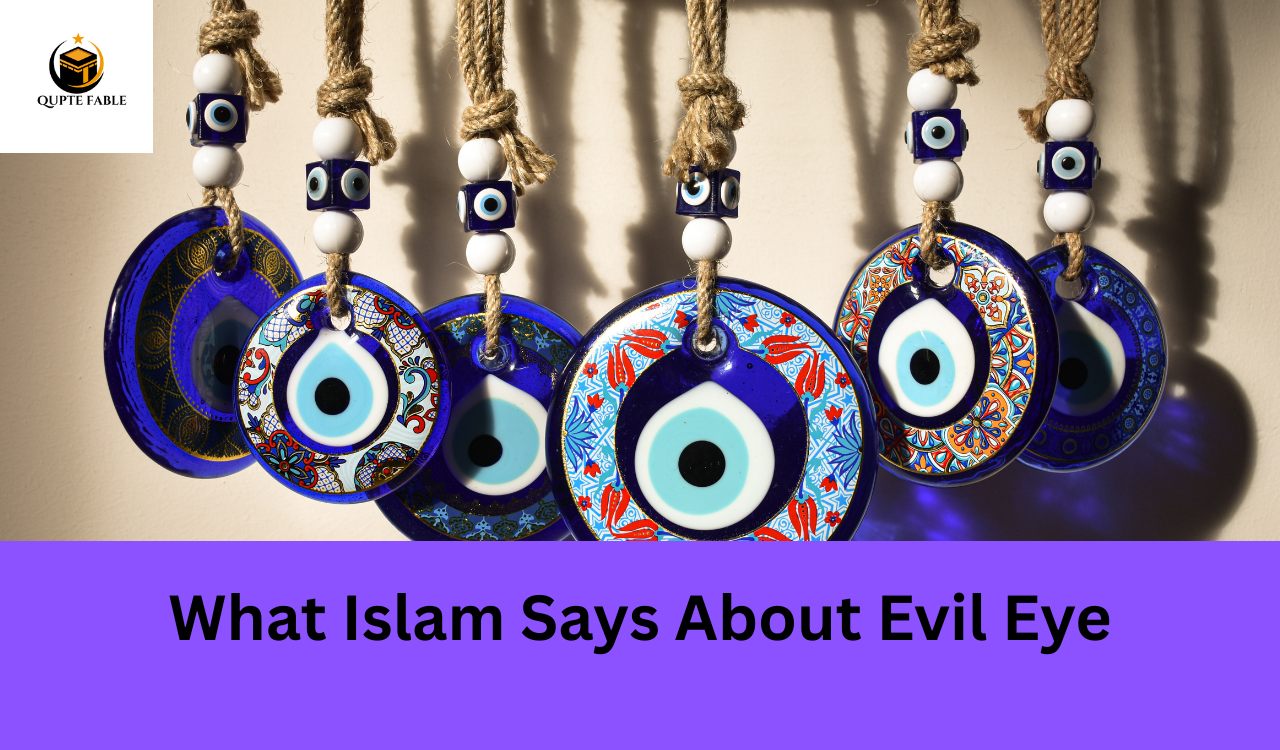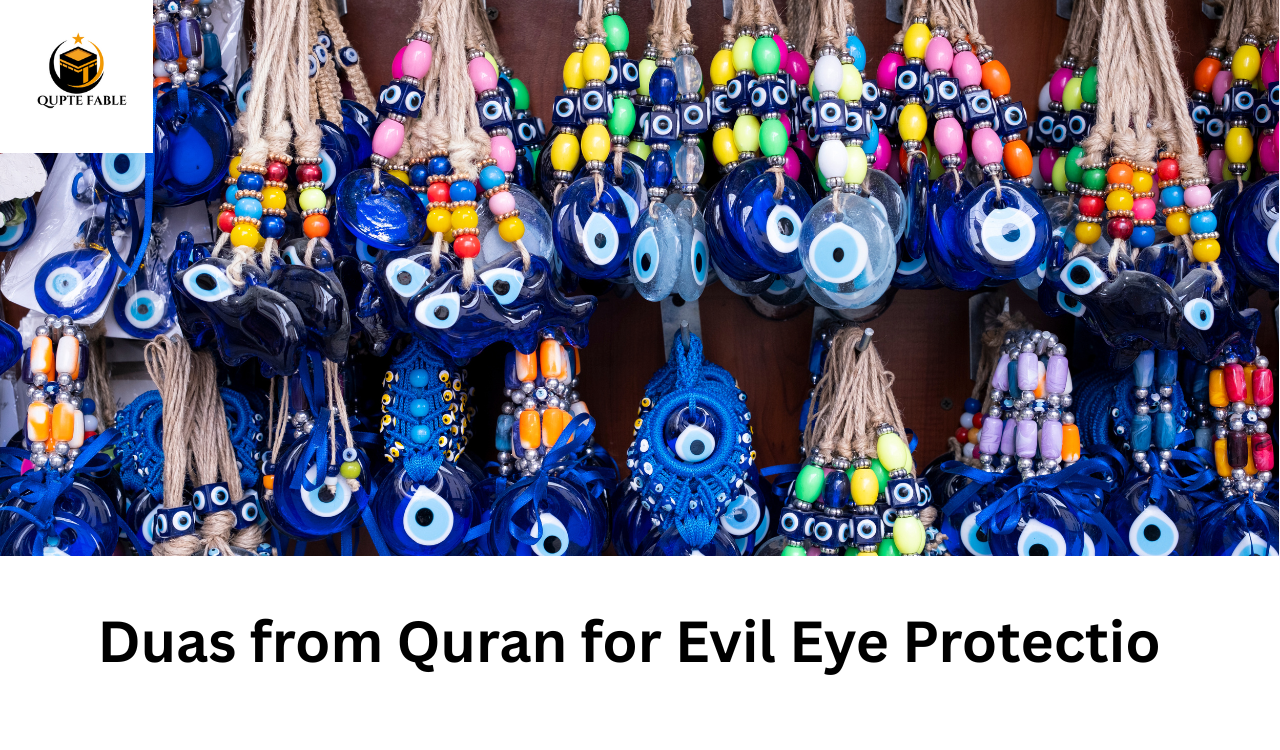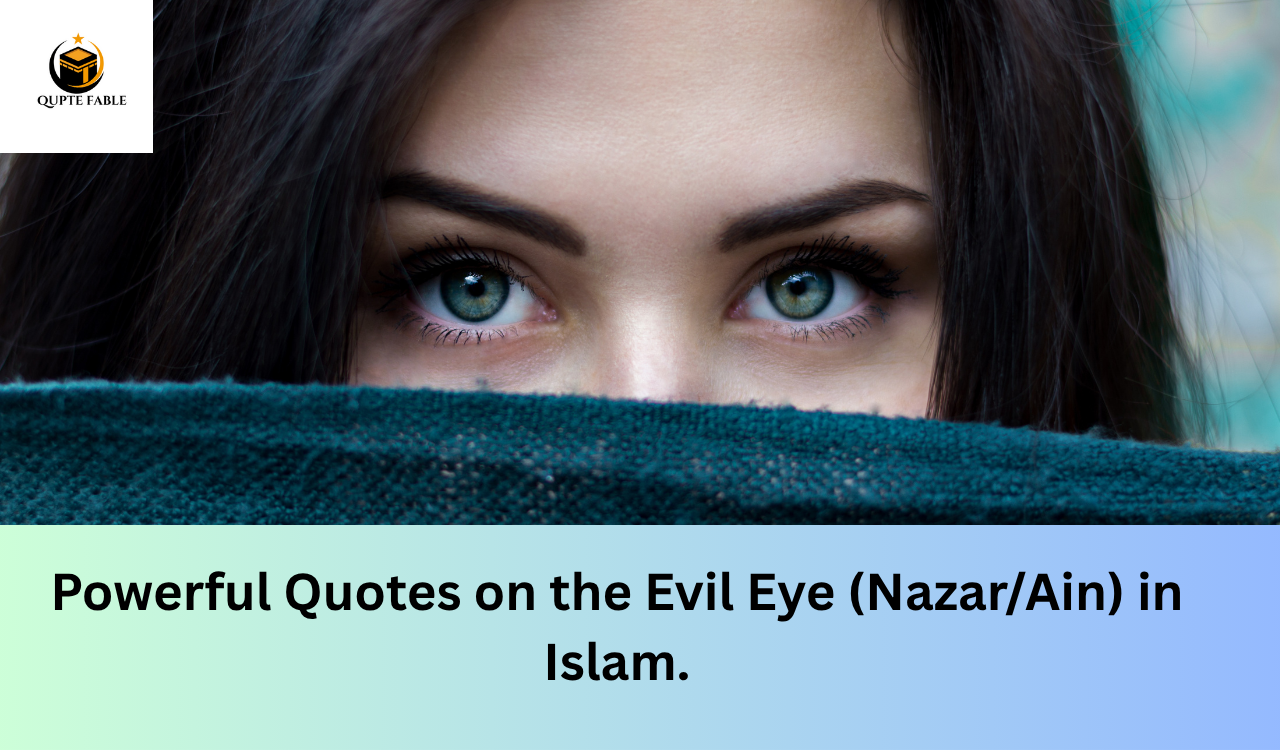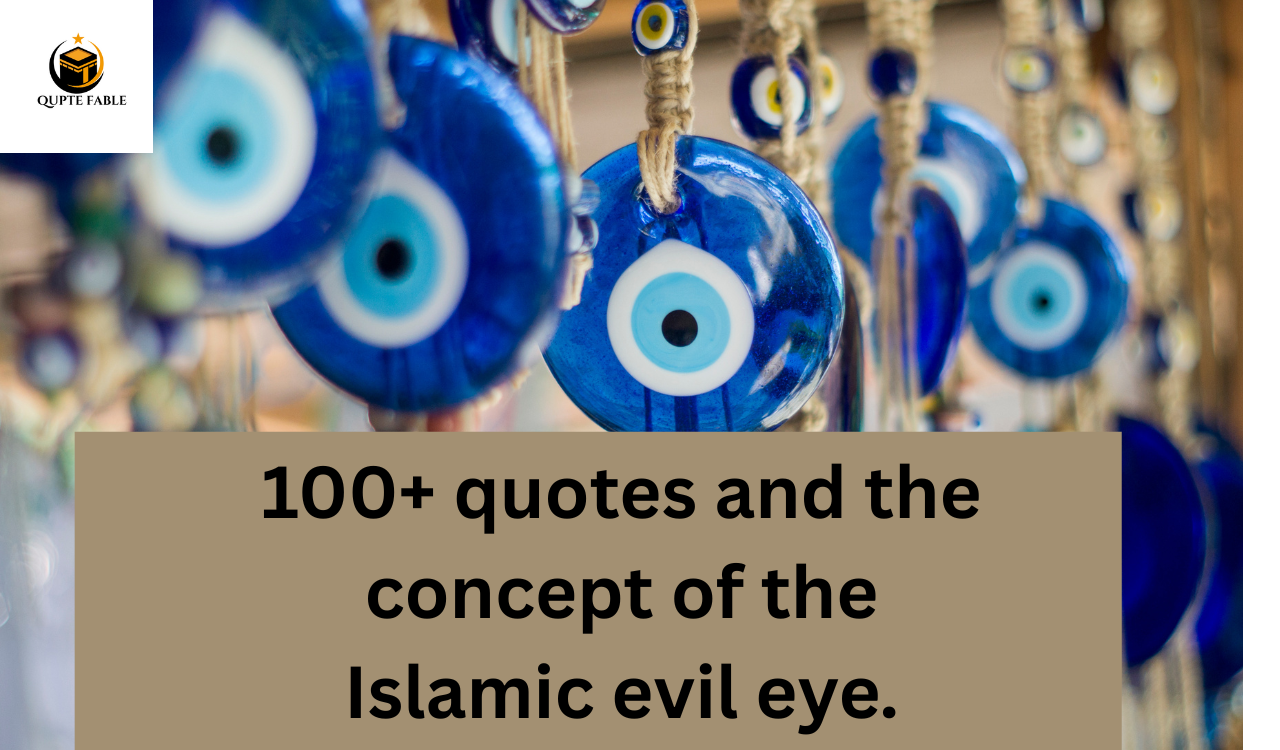The concept of the evil eye, known as Nazar or Ain in Islam, is deeply rooted in both religious teachings and cultural beliefs. Islam acknowledges the reality of the evil eye, describing it as a harmful gaze fueled by jealousy or admiration that can bring misfortune or harm to others. The Quran and Hadith provide clear guidance on recognising its dangers and seeking protection through faith, prayers, and specific supplications. While some may dismiss it as superstition, Islamic tradition treats it as a genuine spiritual threat that requires divine intervention and preventive measures.
Across different cultures and religions, the evil eye has been recognised as a powerful force, often countered with amulets, prayers, or rituals. However, in Islam, the ultimate defence lies in trusting Allah, reciting Quranic verses, and following the Sunnah of Prophet Muhammad (PBUH). By understanding its nature and adopting protective practices, believers can safeguard themselves and their loved ones from its negative effects. This article explores Islamic teachings on the evil eye, along with practical ways to seek protection through Quranic verses, Hadith, and daily spiritual practices.
- “Islam acknowledges the evil eye as real, warning believers to seek protection through faith and divine supplications.”
- “The evil eye stems from envy; Islam teaches us to shield ourselves with prayer and trust in Allah.”
- “Prophet Muhammad (PBUH) confirmed the evil eye’s reality, urging Muslims to recite protective verses for safety.”
- “In Islam, the evil eye is not mere superstition—it’s a spiritual harm requiring divine intervention for protection.”
- “Allah’s mercy surpasses all evil; seeking refuge in Him is the ultimate defense against the evil eye.”

What Islam Says About Evil Eye
- “The Quran mentions the evil eye subtly, reminding believers that envy can bring harm unless Allah wills otherwise.”
- “Islam teaches that jealousy corrupts the heart; the evil eye is its destructive manifestation on others.”
- “Hadith warns that the evil eye can even cause death, proving its danger in Islamic teachings.”
- “Prophet Muhammad (PBUH) advised reciting ‘Masha’Allah’ to ward off the evil eye when admiring something.”
- “Islam combines faith and action—trust in Allah while taking spiritual precautions against the evil eye’s harm.”
Evil Eye in the Quran
- “Surah Al-Falaq (113:5) seeks refuge from ‘the evil of an envier,’ directly referencing the evil eye’s harm.”
- “Allah says in Surah Yusuf (12:67), hinting at protection from envy, a core aspect of the evil eye.”
- “The Quran doesn’t explicitly say ‘evil eye,’ but its warnings against envy imply its spiritual danger.”
- “Surah Al-Qalam (68:51) describes disbelievers giving the Prophet (PBUH) an evil look, showing its real effects.”
- “Divine words in the Quran shield believers; reciting Ayat al-Kursi guards against evil eye influences.”
Evil Eye in Hadith
- “The Prophet (PBUH) said, ‘The evil eye is real; if anything precedes destiny, it is the evil eye.’” (Muslim)”
- “Hadith teaches that Ruqyah (healing verses) cures evil eye effects, proving its recognition in Sunnah.”
- “Prophet Muhammad (PBUH) advised washing the envier’s body parts and pouring water on the afflicted for cure.”
- “Aisha (RA) reported that the Prophet (PBUH) often sought protection from the evil eye for his family.”
- “Hadith emphasizes saying ‘TabarakAllah’ when admiring to prevent unintentionally casting an evil eye on others.”
Evil Eye Concept in Other Religions
- “Christianity mentions the evil eye in Mark 7:22, listing envy among sins that defile a person.”
- “Judaism’s ‘Ayin Hara’ mirrors Islam’s evil eye, warning against jealousy and promoting protective prayers like ‘Kein Ayin Hara.’”
- “Hinduism believes in ‘Nazar,’ using black dots or amulets to deflect negative energy from evil eyes.”
- “Ancient Greek and Roman cultures feared the evil eye, using talismans like the ‘Nazar’ bead for protection.”
- “Buddhism teaches mindfulness to overcome envy, indirectly addressing the evil eye’s root cause—negative intentions.”
Protecting Family and Kids from Evil Eye
- “Recite ‘Bismillah’ and ‘Masha’Allah’ over children to shield them from jealous gazes and evil eye harm.”
- “Hang Quranic verses like Ayat al-Kursi in your home as a spiritual barrier against evil eye effects.”
- “Teach kids to avoid showing off blessings, as humility reduces envy and evil eye risks.”
- “Regularly recite Surah Al-Falaq and An-Nas over family members for divine protection from evil influences.”
- “Limit sharing children’s photos excessively; unseen envy can unintentionally attract the evil eye’s harm.
Five Quranic verses related to protection, along with their English and Urdu translations:
1. Surah Al-Falaq (113:1-5)
Arabic:
قُلْ أَعُوذُ بِرَبِّ الْفَلَقِ ﴿١﴾ مِن شَرِّ مَا خَلَقَ ﴿٢﴾ وَمِن شَرِّ غَاسِقٍ إِذَا وَقَبَ ﴿٣﴾ وَمِن شَرِّ النَّفَّاثَاتِ فِي الْعُقَدِ ﴿٤﴾ وَمِن شَرِّ حَاسِدٍ إِذَا حَسَدَ ﴿٥﴾
English:
“Say, ‘I seek refuge in the Lord of daybreak (1) From the evil of what He created (2) And from the evil of darkness when it settles (3) And from the evil of the blowers in knots (4) And from the evil of an envier when he envies.'” (5)
Urdu:
“کہہ دو، میں صبح کے رب کی پناہ مانگتا ہوں (1) ہر اُس چیز کے شر سے جو اُس نے پیدا کی (2) اور اندھیری رات کے شر سے جب وہ چھا جائے (3) اور گرہوں میں پھونک مارنے والیوں کے شر سے (4) اور حاسد کے شر سے جب وہ حسد کرے۔” (5)
2. Surah An-Nas (114:1-6)
Arabic:
قُلْ أَعُوذُ بِرَبِّ النَّاسِ ﴿١﴾ مَلِكِ النَّاسِ ﴿٢﴾ إِلَـٰهِ النَّاسِ ﴿٣﴾ مِن شَرِّ الْوَسْوَاسِ الْخَنَّاسِ ﴿٤﴾ الَّذِي يُوَسْوِسُ فِي صُدُورِ النَّاسِ ﴿٥﴾ مِنَ الْجِنَّةِ وَالنَّاسِ ﴿٦﴾
English:
“Say, ‘I seek refuge in the Lord of mankind (1) The Sovereign of mankind (2) The God of mankind (3) From the evil of the retreating whisperer (4) Who whispers [evil] into the breasts of mankind (5) From among the jinn and mankind.'” (6)
Urdu:
“کہہ دو، میں لوگوں کے رب کی پناہ مانگتا ہوں (1) لوگوں کے بادشاہ کی (2) لوگوں کے معبود کی (3) وسوسہ ڈالنے والے کے شر سے جو پیچھے ہٹ جاتا ہے (4) جو لوگوں کے دلوں میں وسوسے ڈالتا ہے (5) خواہ وہ جنات میں سے ہو یا انسانوں میں سے۔” (6)
3. Ayat al-Kursi (Surah Al-Baqarah 2:255)
Arabic:
اللَّهُ لَا إِلَـٰهَ إِلَّا هُوَ الْحَيُّ الْقَيُّومُ ۚ لَا تَأْخُذُهُ سِنَةٌ وَلَا نَوْمٌ ۚ لَّهُ مَا فِي السَّمَاوَاتِ وَمَا فِي الْأَرْضِ ۗ مَن ذَا الَّذِي يَشْفَعُ عِندَهُ إِلَّا بِإِذْنِهِ ۚ يَعْلَمُ مَا بَيْنَ أَيْدِيهِمْ وَمَا خَلْفَهُمْ ۖ وَلَا يُحِيطُونَ بِشَيْءٍ مِّنْ عِلْمِهِ إِلَّا بِمَا شَاءَ ۚ وَسِعَ كُرْسِيُّهُ السَّمَاوَاتِ وَالْأَرْضَ ۖ وَلَا يَئُودُهُ حِفْظُهُمَا ۚ وَهُوَ الْعَلِيُّ الْعَظِيمُ
English:
“Allah! There is no deity except Him, the Ever-Living, the Sustainer of existence. Neither drowsiness overtakes Him nor sleep. To Him belongs whatever is in the heavens and whatever is on the earth. Who is it that can intercede with Him except by His permission? He knows what is before them and what will be after them, and they encompass not a thing of His knowledge except for what He wills. His Kursi extends over the heavens and the earth, and their preservation tires Him not. And He is the Most High, the Most Great.”
Urdu:
“اللہ! اس کے سوا کوئی معبود نہیں، وہ زندہ ہے، ہر چیز کو سنبھالنے والا ہے۔ نہ اُسے اونگھ آتی ہے نہ نیند۔ آسمانوں اور زمین میں جو کچھ ہے، سب اسی کا ہے۔ کون ہے جو اس کے ہاں اس کی اجازت کے بغیر سفارش کر سکے؟ وہ جانتا ہے جو کچھ لوگوں کے سامنے ہے اور جو کچھ ان کے پیچھے ہے، اور وہ اس کے علم میں سے کسی چیز کا احاطہ نہیں کر سکتے مگر جو وہ چاہے۔ اس کی کرسی آسمانوں اور زمین کو گھیرے ہوئے ہے، اور ان کی حفاظت اسے تھکاتی نہیں۔ اور وہ بلند مرتبہ، عظمت والا ہے۔”
4. Surah Al-Ikhlas (112:1-4)
Arabic:
قُلْ هُوَ اللَّهُ أَحَدٌ ﴿١﴾ اللَّهُ الصَّمَدُ ﴿٢﴾ لَمْ يَلِدْ وَلَمْ يُولَدْ ﴿٣﴾ وَلَمْ يَكُن لَّهُ كُفُوًا أَحَدٌ ﴿٤﴾
English:
“Say, ‘He is Allah, the One (1) Allah, the Eternal Refuge (2) He neither begets nor is born (3) Nor is there to Him any equivalent.'” (4)
Urdu:
“کہہ دو کہ وہ اللہ ایک ہے (1) اللہ بے نیاز ہے (2) نہ اس کی کوئی اولاد ہے نہ وہ کسی سے پیدا ہوا (3) اور نہ ہی کوئی اس کا ہمسر ہے۔” (4)
5. Surah Yunus (10:107)
Arabic:
وَإِن يَمْسَسْكَ اللَّهُ بِضُرٍّ فَلَا كَاشِفَ لَهُ إِلَّا هُوَ ۖ وَإِن يُرِدْكَ بِخَيْرٍ فَلَا رَادَّ لِفَضْلِهِ ۚ يُصِيبُ بِهِ مَن يَشَاءُ مِنْ عِبَادِهِ ۚ وَهُوَ الْغَفُورُ الرَّحِيمُ
English:
“And if Allah should touch you with adversity, there is no remover of it except Him. And if He intends for you good, then there is no repeller of His bounty. He causes it to reach whom He wills of His servants. And He is the Forgiving, the Merciful.”
Urdu:
“اور اگر اللہ تمہیں کوئی تکلیف پہنچائے تو اسے دور کرنے والا بھی وہی ہے، اور اگر تمہیں بھلائی دے تو کوئی اس کے فضل کو روکنے والا نہیں۔ وہ اپنے بندوں میں سے جسے چاہتا ہے، اسے پہنچاتا ہے، اور وہ بخشنے والا، مہربان ہے۔”
These verses are powerful for protection against evil eye, envy, and harm. Reciting them with faith can serve as a spiritual shield.
Evil Eye Concept in Other Religions
“Christianity mentions the evil eye in Mark 7:22, listing envy among sins that defile a person.”
“Judaism’s ‘Ayin Hara’ mirrors Islam’s evil eye, warning against jealousy and promoting protective prayers like ‘Kein Ayin Hara.’”
“Hinduism believes in ‘Nazar,’ using black dots or amulets to deflect negative energy from evil eyes.”
“Ancient Greek and Roman cultures feared the evil eye, using talismans like the ‘Nazar’ bead for protection.”
“Buddhism teaches mindfulness to overcome envy, indirectly addressing the evil eye’s root cause—negative intentions.”
Protecting Family and Kids from Evil Eye
- “Recite ‘Bismillah’ and ‘Masha’Allah’ over children to shield them from jealous gazes and evil eye harm.”
- “Hang Quranic verses like Ayat al-Kursi in your home as a spiritual barrier against evil eye effects.”
- “Teach kids to avoid showing off blessings, as humility reduces envy and evil eye risks.”
- “Regularly recite Surah Al-Falaq and An-Nas over family members for divine protection from evil influences.”
- “Limit sharing children’s photos excessively; unseen envy can unintentionally attract the evil eye’s harm.”
20 Duas from Quran for Evil Eye Protection
- “Surah Al-Falaq (113:1-5): ‘Say, I seek refuge in the Lord of daybreak from the evil of envious ones.’”
- “Surah An-Nas (114:1-6): ‘I seek refuge in the Lord of mankind from the whisperings of devils.’”
- “Ayat al-Kursi (2:255): ‘Allah—there is no deity except Him, the Ever-Living, the Sustainer of existence.’”
- “Surah Al-Ikhlas (112:1-4): Reciting it thrice with Falaq and Nas forms a powerful protective shield.”
- “Surah Al-A’raf (7:54): ‘Indeed, your Lord is Allah, who created the heavens and earth in six days.’”

Evil Eye Stories from Prophet Muhammad’s (PBUH) Life
“Aisha (RA) narrated that the Prophet (PBUH) often blew protective prayers on his hands and wiped his body.”
“A man once fell ill; the Prophet (PBUH) identified it as evil eye and cured him with Ruqyah.”
“Prophet Muhammad (PBUH) saw Sahabah affected by evil eye; he taught them protective supplications for healing.”
“A camel was weakened by evil eye; the Prophet (PBUH) advised washing the envier’s face for cure.”
“The Prophet (PBUH) protected Hassan and Hussain by reciting, ‘I seek refuge for you in Allah’s words.’”

20 Powerful Quotes on the Evil Eye (Nazar/Ain) in Islam.
- “The evil eye is real; if anything could precede destiny, it would be the evil eye.” (Sahih Muslim 2188)
- “When one of you sees something admirable in himself or his belongings, let him say Masha’Allah to ward off the evil eye.” (Sunan Ibn Majah 3509)
- “Envy consumes good deeds just as fire devours wood.” (Sunan Abi Dawud 4903)
- “Seek refuge in Allah from the evil eye, for it can make a healthy person ill and a strong person weak.” (Ibn Majah 3508)
- “The evil eye enters like an arrow—fast and unseen—unless countered with faith and prayer.” (At-Tabarani)
- “Whoever admires something should say BarakAllahu feek (May Allah bless it), or the evil eye may strike.” *(Al-Jami’ as-Sagheer 4029)*
- “A single envious glance can bring ruin—protection lies in Allah’s remembrance.”
- “The Prophet (PBUH) would recite Mu’awwidhat (Surah Falaq & Nas) for protection from evil eyes.” (Tirmidhi 1984)
- “Jealousy is a disease of the heart; the evil eye is its poisonous effect.”
- “Allah’s names are the greatest shield—recite Ya Hafeez (The Protector) to repel harm.”
- “The evil eye does not discriminate—it can affect wealth, beauty, children, and even faith.”
- “Ruqyah (Quranic healing) is the Sunnah cure for evil eye afflictions.” (Bukhari 5735)
- “Wearing amulets for protection is shirk—trust only in Allah’s words for safety.” (Ahmad 4927)
- “A believer’s strongest armor against envy is humility and gratitude.”
- “The evil eye spreads fastest among those who show off blessings without thanking Allah.”
- “Prophet Muhammad (PBUH) taught us to wash the envier’s hands and sprinkle water on the afflicted.” (Abu Dawud 3885)
- “Surah Al-Ikhlas, Falaq, and Nas recited three times at dawn and dusk are a fortress against evil.”
- “The cure for the evil eye is in the Quran—neglecting it leaves wounds unhealed.”
- “Allah’s mercy outweighs all envy—seek His refuge, and no evil eye can prevail.”
- “The best protection? HasbunAllahu wa Ni’mal Wakeel (Allah is sufficient for us, and He is the Best Disposer of affairs).” (Quran 3:173)
- “The evil eye is real; if anything could precede destiny, it would be the evil eye.” (Sahih Muslim 2188)
- “When one of you sees something admirable in himself or his belongings, let him say Masha’Allah to ward off the evil eye.” (Sunan Ibn Majah 3509)
- “Envy consumes good deeds just as fire devours wood.” (Sunan Abi Dawud 4903)
- “Seek refuge in Allah from the evil eye, for it can make a healthy person ill and a strong person weak.” (Ibn Majah 3508)
- “The evil eye enters like an arrow—fast and unseen—unless countered with faith and prayer.” (At-Tabarani)
- “Whoever admires something should say BarakAllahu feek (May Allah bless it), or the evil eye may strike.” *(Al-Jami’ as-Sagheer 4029)*
- “A single envious glance can bring ruin—protection lies in Allah’s remembrance.”
- “The Prophet (PBUH) would recite Mu’awwidhat (Surah Falaq & Nas) for protection from evil eyes.” (Tirmidhi 1984)
- “Jealousy is a disease of the heart; the evil eye is its poisonous effect.”
- “Allah’s names are the greatest shield—recite Ya Hafeez (The Protector) to repel harm.”
- “The evil eye does not discriminate—it can affect wealth, beauty, children, and even faith.”
- “Ruqyah (Quranic healing) is the Sunnah cure for evil eye afflictions.” (Bukhari 5735)
- “Wearing amulets for protection is shirk—trust only in Allah’s words for safety.” (Ahmad 4927)
- “A believer’s strongest armor against envy is humility and gratitude.”
- “The evil eye spreads fastest among those who show off blessings without thanking Allah.”
- “Prophet Muhammad (PBUH) taught us to wash the envier’s hands and sprinkle water on the afflicted.” (Abu Dawud 3885)
- “Surah Al-Ikhlas, Falaq, and Nas recited three times at dawn and dusk are a fortress against evil.”
- “The cure for the evil eye is in the Quran—neglecting it leaves wounds unhealed.”
- “Allah’s mercy outweighs all envy—seek His refuge, and no evil eye can prevail.”
- “The best protection? HasbunAllahu wa Ni’mal Wakeel (Allah is sufficient for us, and He is the Best Disposer of affairs).” (Quran 3:173)
- “The evil eye is real; if anything could precede destiny, it would be the evil eye.” (Sahih Muslim 2188)
- “When one of you sees something admirable in himself or his belongings, let him say Masha’Allah to ward off the evil eye.” (Sunan Ibn Majah 3509)
- “Envy consumes good deeds just as fire devours wood.” (Sunan Abi Dawud 4903)
- “Seek refuge in Allah from the evil eye, for it can make a healthy person ill and a strong person weak.” (Ibn Majah 3508)
- “The evil eye enters like an arrow—fast and unseen—unless countered with faith and prayer.” (At-Tabarani)
- “Whoever admires something should say BarakAllahu feek (May Allah bless it), or the evil eye may strike.” *(Al-Jami’ as-Sagheer 4029)*
- “A single envious glance can bring ruin—protection lies in Allah’s remembrance.”
- “The Prophet (PBUH) would recite Mu’awwidhat (Surah Falaq & Nas) for protection from evil eyes.” (Tirmidhi 1984)
- “Jealousy is a disease of the heart; the evil eye is its poisonous effect.”
- “Allah’s names are the greatest shield—recite Ya Hafeez (The Protector) to repel harm.”
- “The evil eye does not discriminate—it can affect wealth, beauty, children, and even faith.”
- “Ruqyah (Quranic healing) is the Sunnah cure for evil eye afflictions.” (Bukhari 5735)
- “Wearing amulets for protection is shirk—trust only in Allah’s words for safety.” (Ahmad 4927)
- “A believer’s strongest armor against envy is humility and gratitude.”
- “The evil eye spreads fastest among those who show off blessings without thanking Allah.”
- “Prophet Muhammad (PBUH) taught us to wash the envier’s hands and sprinkle water on the afflicted.” (Abu Dawud 3885)
- “Surah Al-Ikhlas, Falaq, and Nas recited three times at dawn and dusk are a fortress against evil.”
- “The cure for the evil eye is in the Quran—neglecting it leaves wounds unhealed.”
- “Allah’s mercy outweighs all envy—seek His refuge, and no evil eye can prevail.”
- “The best protection? HasbunAllahu wa Ni’mal Wakeel (Allah is sufficient for us, and He is the Best Disposer of affairs).” (Quran 3:173)
conclusion
In conclusion, Islam affirms the reality of the evil eye as a spiritual harm caused by envy and admiration, urging believers to seek protection through faith, Quranic recitations, and the teachings of Prophet Muhammad (PBUH). By reciting Surahs like Al-Falaq and An-Nas, practicing humility, and trusting in Allah’s divine guardianship, Muslims can shield themselves and their families from its harmful effects. While other cultures may rely on talismans or superstitions, Islam provides a clear, faith-based approach—rooted in the Quran and Sunnah—to neutralize the evil eye’s influence. Ultimately, sincere devotion, constant remembrance of Allah, and adherence to prophetic remedies serve as the strongest defence against this unseen but very real danger.
please read the related post:The Islamic Concept of True Friendship

